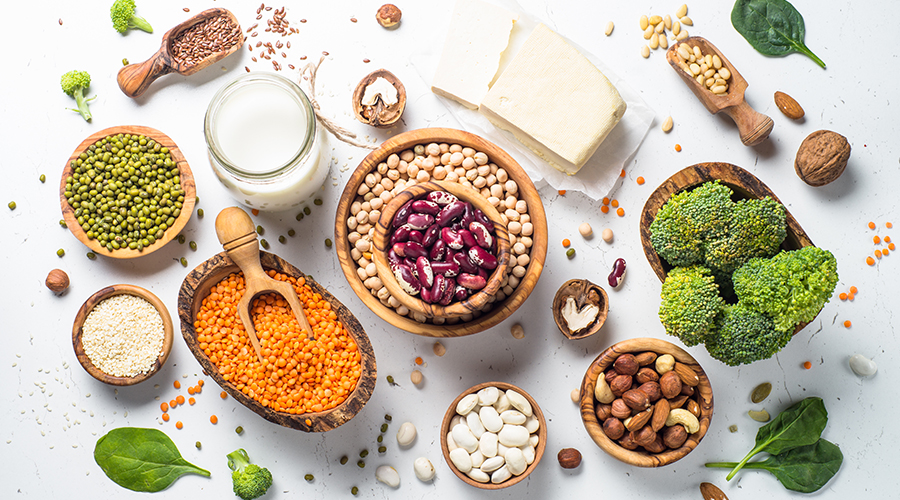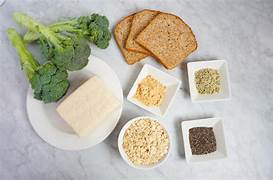
Plant-based protein sources offer a diverse and nutritious way to meet your protein needs. Key options include legumes like lentils and beans, soy products like tofu and tempeh, whole grains such as quinoa and oats, nuts and seeds like peanuts and chia seeds, and even some vegetables like broccoli. These sources can be incorporated into various meals and snacks, providing a complete package of nutrients and benefiting both health and the environment.
Elaboration:
The Power of Protein: How to Boost Your Diet with Plant-Based Protein Sources
Discover the incredible benefits of plant-based protein sources in this comprehensive guide. From improving your health to supporting sustainable eating habits, learn how to easily incorporate a variety of protein-rich plants like legumes, tofu, quinoa, and more into your daily meals for better nutrition and overall well-being.
What is Protein and Why Do You Need It?
Before we dive into plant-based sources, let me take a moment to explain exactly what protein is and why it’s so important. You see, protein is made up of smaller units called amino acids. These amino acids are like building blocks, and your body uses them to build muscles, repair tissues, and produce important chemicals, such as enzymes and hormones.
Our bodies need 20 different amino acids, and we can make 11 of them on our own. However, the other 9 amino acids, called essential amino acids, must come from the food we eat. That’s why it’s important to eat a variety of protein-rich foods to ensure you get all the essential amino acids your body needs.
The Benefits of Plant-Based Protein
Now, you might be thinking, “Grandma, I’ve always been told that meat is the best source of protein!” While it’s true that meat, poultry, and dairy products are rich in protein, they’re not the only sources. In fact, plant-based proteins offer many wonderful benefits that might make you reconsider how you approach your diet:
Lower in Fat and Calories: Plant-based proteins are typically lower in saturated fats and calories compared to animal-based sources, which makes them a great choice if you’re looking to manage your weight or lower cholesterol.
Packed with Fiber: Unlike animal proteins, most plant-based proteins also come with fiber. Fiber is important for digestive health, helping to keep you regular and supporting healthy cholesterol levels.
Rich in Antioxidants and Nutrients: Many plant-based protein sources are full of vitamins, minerals, and antioxidants that can support your overall health. For example, beans and lentils are great sources of iron, magnesium, and folate, while nuts and seeds provide healthy fats and vitamin E.
Better for the Environment: Plant-based protein sources are also much kinder to the planet. They require less water, land, and energy to produce compared to animal products, and they have a smaller carbon footprint.
Reduce Risk of Chronic Diseases: Studies show that a plant-based diet can help lower the risk of chronic diseases like heart disease, diabetes, and certain cancers. The fiber, healthy fats, and antioxidants found in plants play a significant role in maintaining long-term health.
Top Plant-Based Protein Sources
There are so many delicious and healthy plant-based protein options out there that you can add to your meals. Let me share some of my favorite ones with you!
Legumes (Beans, Lentils, and Chickpeas)
Beans, lentils, and chickpeas are some of the best plant-based protein sources you can eat. They’re packed with protein, fiber, and essential vitamins and minerals. For example, one cup of cooked lentils contains about 18 grams of protein and 15 grams of fiber! You can add them to soups, salads, or make a hearty stew. Chickpeas can be roasted for a crunchy snack or blended into hummus for a delicious dip.
Tofu and Tempeh
Tofu and tempeh are made from soybeans and are rich in protein. Tofu has a soft, smooth texture, and it can be used in savory or sweet dishes. Tempeh, on the other hand, has a firmer texture and a nutty flavor. Both of these soy-based products are excellent sources of protein—one cup of tempeh can provide you with about 30 grams of protein! You can stir-fry, grill, or use them in soups and salads.
Quinoa
Quinoa is a complete protein, meaning it contains all nine essential amino acids. It’s also gluten-free, making it a great choice for those with dietary restrictions. One cup of cooked quinoa provides around 8 grams of protein, along with fiber, iron, and magnesium. You can use quinoa as a base for salads, stir-fries, or as a side dish with vegetables.
Nuts and Seeds
Nuts and seeds are not only a great source of protein, but they’re also rich in healthy fats that can keep your heart healthy. Almonds, peanuts, sunflower seeds, and chia seeds are all excellent choices. Just a handful of almonds (about 23 almonds) gives you about 6 grams of protein. You can sprinkle them on top of salads, mix them into smoothies, or just enjoy them as a snack.
Edamame
Edamame, or young soybeans, are a fantastic protein-packed snack. A cup of cooked edamame contains around 17 grams of protein. You can buy them frozen and simply steam them for a quick and tasty treat. They’re also great in salads, stir-fries, and grain bowls.
Seitan
Seitan, often called wheat meat, is made from gluten, the protein found in wheat. It’s a popular meat substitute for vegans and vegetarians due to its texture, which is similar to meat. Seitan is packed with protein, with about 25 grams of protein per 3-ounce serving. You can use it in stir-fries, sandwiches, or even make vegan “chicken” nuggets.
Green Vegetables
Don’t forget about your leafy greens! While they don’t contain as much protein as legumes or tofu, green vegetables like spinach, kale, and broccoli still provide a nice boost of protein. For example, one cup of cooked spinach contains about 5 grams of protein. You can easily add these greens to your meals, whether you’re making a salad, smoothie, or side dish.
Plant-Based Protein Powders
If you find it difficult to get enough protein from food alone, you might consider adding a plant-based protein powder to your diet. There are many options made from pea protein, brown rice protein, hemp protein, and more. You can blend these powders into smoothies, oatmeal, or even baking recipes.
How to Incorporate More Plant-Based Proteins Into Your Diet
Now that you know all about the wonderful plant-based protein sources, you might be wondering how to incorporate them into your meals. Here are some easy tips:
Start Your Day with Protein: Add some plant-based protein to your breakfast! You can make a smoothie with almond butter, chia seeds, and spinach, or enjoy a bowl of oatmeal topped with nuts and seeds.
Snack Smart: Keep snacks like edamame, almonds, or a protein bar handy. These are great options when you’re hungry between meals.
Make Protein-Rich Salads: Add beans, quinoa, or chickpeas to your salads for an extra boost of protein. Top with some avocado and a drizzle of olive oil for healthy fats.
Try Meatless Meals: Experiment with plant-based meat substitutes like tofu, tempeh, or seitan in your favorite recipes. They work wonderfully in stir-fries, sandwiches, and even tacos.
Switch Up Your Grains: Instead of rice, try quinoa, farro, or barley. These grains are packed with protein and add a lovely texture to your dishes.
Baking with Protein: You can also use plant-based protein powders in your baking. Try adding a scoop of protein powder to muffins, pancakes, or energy bars.
Q&A Section
Q: Can I get enough protein on a plant-based diet?
Ans) Absolutely! As long as you eat a variety of plant-based proteins, you can easily meet your protein needs. Focus on legumes, nuts, seeds, whole grains, and soy-based products like tofu and tempeh. A diverse diet ensures you get all the essential amino acids your body needs.
Q: Do I need to worry about protein timing or combining different plant proteins?
Ans) No, you don’t need to stress about combining proteins at every meal. Your body is great at storing amino acids, so as long as you eat a variety of protein-rich foods throughout the day, you’ll get all the amino acids you need.
Q: Are plant-based proteins enough for athletes?
Ans) Yes, plant-based proteins can support athletic performance just as well as animal proteins! Many professional athletes follow plant-based diets and thrive. If you’re very active, you may need to eat a bit more protein, but there are plenty of options like lentils, quinoa, and plant-based protein powders to meet those needs.
Q: Can I switch to a plant-based protein diet if I’m used to eating animal protein?
Ans) Absolutely! It’s perfectly fine to transition slowly. Start by adding more plant-based meals to your diet each week, and gradually reduce animal products. Your body will adjust, and soon you’ll be enjoying all the benefits of plant-based eating.
